aRtonal
 In an era when so many guitarists have taken to laptop processing in order to coax new life from their thought-tired instruments, it seems only fair that other solo-instrumentalists should join the fun. And while the cello has enjoyed its fair share of fusion within the rock sphere, I've yet to see someone sit alone with this instrument, so engorged with classical and acoustic traditions, and really "plug in." Part of what makes Arnold Haberl's output as Noid so fascinating is the way the Austrian cellist moves beyond a banal, deconstructivist treatment of his playing and into ideas for composition where the computer feels less like a medium guiding the production of a piece and more like a voice within the music, to be engaged and countered, rather than simply played-through. Haberl's pieces branch off of strict minimalist ideas, bypassing crude layering techniques of the analog past and instead favoring tightly-wound, stuttering loop effects, drawn out often to the realm of nauseous formalism. Rarely is any multi-tracking involved in Noid's creations; rather miniature fragments of playing are captured, treated, and allowed to loop out, at times for over ten minutes with no real variation. The cello's woody groan becomes an industrial sander on the opening "melodien," stripped of human presence, even a performer's pause or the negative space of a hand slightly off-beat. It's clear after such a beginning that this will be "process" music, here less about the process of making, which becomes increasingly transparent as the disc progresses, and more about the process of listening, of accepting the music's sensory overload in juxtaposition with virtual lifelessness of the sounds themselves and the possibility of their "performance." Haberl does perform with live sampling and manipulation, and the points on Monodigmen where his cello is left recognizable logically become some of the most mind-numbing. "Vacuum 1" is a 12-minute piece of the cellist in lock-groove mode, struggling around what sounds like the opening strains of "Flight of the Bumblebee." After the question of Haberl actually playing such an infernal half-measure over and over again has been ruled out, listening becomes a tug-of-war between enduring the instrument's stunted flight and the utter detachment resulting from the search for patterns, or anything "material" in the music, and finding nothing. I hesitate to dismiss Noid's music as a purely formal exercise because of the way he continuously engages the elements of poise and human concentration almost inseparable from his chosen instrument, in an ultimate reduction of all that is traditionally expressive about it. There are times when Monodigmen feels like an extension of Cage's efforts to communicate the zen-like void or 'nothing' in musical composition; other times, however, Haberl's creation seems too much of an endurance test to communicate anything worth the time it takes to get there.
In an era when so many guitarists have taken to laptop processing in order to coax new life from their thought-tired instruments, it seems only fair that other solo-instrumentalists should join the fun. And while the cello has enjoyed its fair share of fusion within the rock sphere, I've yet to see someone sit alone with this instrument, so engorged with classical and acoustic traditions, and really "plug in." Part of what makes Arnold Haberl's output as Noid so fascinating is the way the Austrian cellist moves beyond a banal, deconstructivist treatment of his playing and into ideas for composition where the computer feels less like a medium guiding the production of a piece and more like a voice within the music, to be engaged and countered, rather than simply played-through. Haberl's pieces branch off of strict minimalist ideas, bypassing crude layering techniques of the analog past and instead favoring tightly-wound, stuttering loop effects, drawn out often to the realm of nauseous formalism. Rarely is any multi-tracking involved in Noid's creations; rather miniature fragments of playing are captured, treated, and allowed to loop out, at times for over ten minutes with no real variation. The cello's woody groan becomes an industrial sander on the opening "melodien," stripped of human presence, even a performer's pause or the negative space of a hand slightly off-beat. It's clear after such a beginning that this will be "process" music, here less about the process of making, which becomes increasingly transparent as the disc progresses, and more about the process of listening, of accepting the music's sensory overload in juxtaposition with virtual lifelessness of the sounds themselves and the possibility of their "performance." Haberl does perform with live sampling and manipulation, and the points on Monodigmen where his cello is left recognizable logically become some of the most mind-numbing. "Vacuum 1" is a 12-minute piece of the cellist in lock-groove mode, struggling around what sounds like the opening strains of "Flight of the Bumblebee." After the question of Haberl actually playing such an infernal half-measure over and over again has been ruled out, listening becomes a tug-of-war between enduring the instrument's stunted flight and the utter detachment resulting from the search for patterns, or anything "material" in the music, and finding nothing. I hesitate to dismiss Noid's music as a purely formal exercise because of the way he continuously engages the elements of poise and human concentration almost inseparable from his chosen instrument, in an ultimate reduction of all that is traditionally expressive about it. There are times when Monodigmen feels like an extension of Cage's efforts to communicate the zen-like void or 'nothing' in musical composition; other times, however, Haberl's creation seems too much of an endurance test to communicate anything worth the time it takes to get there.
samples:



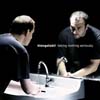 After several releases for various labels, this German duo release their first full length for Ant-Zen. The album covers a wide variety of styles and textures in a concise 42 minutes. Over eight tracks they attempt to achieve a balance between melodic and abrasive elements.
After several releases for various labels, this German duo release their first full length for Ant-Zen. The album covers a wide variety of styles and textures in a concise 42 minutes. Over eight tracks they attempt to achieve a balance between melodic and abrasive elements.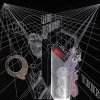 Also on the short side—but decidedly not as fun—is the third album from French musician, vocalist and poet Toog. The record is intended to be a modern variation on Poems For Lou, a book written during World War I by poet and soldier Guillaume Apollinaire who was inspired by a woman named Lou that he loved and lost in Nice before the war. In Toog's version, the role of the muse is played by actress Asia Argento, and WWI is replaced by the war and terrorism of the post-9/11 world. It's impossible for me to verify if Toog's words truly reflect these themes, as aside from two pieces that are sultrily spoken by Argento, all of the readings are in French, a language that I remember very little of from my lessons of many years ago. At least the music, which is produced by French sound artist Digiki, is generally quite nice, mixing together elements of downtempo electro & ambient with low-key pop & hip-hop, and even some hints of industrial, classical and cabaret. Given the strong poetic theme of the work, however, it's quite obvious that without some understanding of the words, listeners just won't get the full message that Toog is trying to convey in the 10 tracks on 'Lou Etendue'.
Also on the short side—but decidedly not as fun—is the third album from French musician, vocalist and poet Toog. The record is intended to be a modern variation on Poems For Lou, a book written during World War I by poet and soldier Guillaume Apollinaire who was inspired by a woman named Lou that he loved and lost in Nice before the war. In Toog's version, the role of the muse is played by actress Asia Argento, and WWI is replaced by the war and terrorism of the post-9/11 world. It's impossible for me to verify if Toog's words truly reflect these themes, as aside from two pieces that are sultrily spoken by Argento, all of the readings are in French, a language that I remember very little of from my lessons of many years ago. At least the music, which is produced by French sound artist Digiki, is generally quite nice, mixing together elements of downtempo electro & ambient with low-key pop & hip-hop, and even some hints of industrial, classical and cabaret. Given the strong poetic theme of the work, however, it's quite obvious that without some understanding of the words, listeners just won't get the full message that Toog is trying to convey in the 10 tracks on 'Lou Etendue'.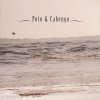 In an attempt to Google up some information about this new project from Jens Massel (previously known for his work as Kandis & Senking) and Michael Cramm, I learned that the original Poto & Cabengo were a pair of identical twin girls—real names Grace & Virginia Kennedy—who spoke to each other in their own secret language for the first decade of their lives. What this has to do with this record is a mystery to me, but it's an interesting bit of trivia nonetheless. Interesting is a good word to describe this album which Massel & Cramm describe as their tribute to the sounds of country & folk music. While the idea of European electronic artists being influenced by American roots music may seem strange, there are precedents such as O Yuki Conjugate and Dead Hollywood Stars. Unlike those earlier examples, Poto & Cabengo tend to stick a little closer to the traditions of the genres, with plenty of pluckin' and singin' sitting alongside the pretty electronic melodies. It's an approach that works more often than not, although the latter part of the record is marred by the bizarre "Suevian Rhapsody," which features a nonsensical combination of croaked spoken vocals and a variety of dialogue samples from movies and television. This is a unique and fun release, and at a compact 36 minutes in length, it wraps up before the concept gets beaten to death.
In an attempt to Google up some information about this new project from Jens Massel (previously known for his work as Kandis & Senking) and Michael Cramm, I learned that the original Poto & Cabengo were a pair of identical twin girls—real names Grace & Virginia Kennedy—who spoke to each other in their own secret language for the first decade of their lives. What this has to do with this record is a mystery to me, but it's an interesting bit of trivia nonetheless. Interesting is a good word to describe this album which Massel & Cramm describe as their tribute to the sounds of country & folk music. While the idea of European electronic artists being influenced by American roots music may seem strange, there are precedents such as O Yuki Conjugate and Dead Hollywood Stars. Unlike those earlier examples, Poto & Cabengo tend to stick a little closer to the traditions of the genres, with plenty of pluckin' and singin' sitting alongside the pretty electronic melodies. It's an approach that works more often than not, although the latter part of the record is marred by the bizarre "Suevian Rhapsody," which features a nonsensical combination of croaked spoken vocals and a variety of dialogue samples from movies and television. This is a unique and fun release, and at a compact 36 minutes in length, it wraps up before the concept gets beaten to death.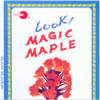 I'm quite sure a devilish tailor is making its way through my eardrums every time I put this record on. It's not that there's anything evil about this record; but every instance of sound is a rapidly moving panorama of subconscious and dream-like sounds accelerated through time and set to explode upon aural reception. Blevin Blectum's newest record plays like a billion ping pong balls shot into a room about three inches wide and tall. The result is a barrage of micro-sounds that weave themselves together to make patterns of pseudo-melody and hushed excursions into the clouded heart of glass machines. At times Magic Maple is propelled by a turbine engine bent on choking some kind of rhythm out of the random chaos of sounds assembled into each song and at other times it's a playful cascade of rushing sounds, skipping semi-percussion, time-distorted bits of radio interference, various vocal samples, and unknown instruments bent and snapped into unrecognizable alien keyboards. Blectum's songs never fall into any recognizable format nor do they rely on any one technique; each song plays like a small portion of something greater that, if it could all be heard at once, would reveal some grand, majestic schematic that can only be hinted at when received through typical, human ears. What's more, Blectum's chaos is catchy: at times a xylophone or inter-dimensional steel drum fades in and out of the mix to reveal bits of repeated melody and mutant rhythms that never quite find their own pace. It's an addicting kind of music because it doesn't look to typical song structures to make it enjoyable, but it also doesn't go overboard and exist somewhere on the edge of sonic tolerance and pure experimental recording. It's almost pointless to talk about these songs individually; most of the time I can't tell where one song ends and the next begins. Everything fits together perfectly, but the whole album modulates within itself and never gets boring or frustrating in all its bouncing glory. The end of the album, however, is particularly outstanding and there are moments when just the smallest changes made by Blectum are breathtaking. Of course, these moments don't last long because she just never bothers to sit still.
I'm quite sure a devilish tailor is making its way through my eardrums every time I put this record on. It's not that there's anything evil about this record; but every instance of sound is a rapidly moving panorama of subconscious and dream-like sounds accelerated through time and set to explode upon aural reception. Blevin Blectum's newest record plays like a billion ping pong balls shot into a room about three inches wide and tall. The result is a barrage of micro-sounds that weave themselves together to make patterns of pseudo-melody and hushed excursions into the clouded heart of glass machines. At times Magic Maple is propelled by a turbine engine bent on choking some kind of rhythm out of the random chaos of sounds assembled into each song and at other times it's a playful cascade of rushing sounds, skipping semi-percussion, time-distorted bits of radio interference, various vocal samples, and unknown instruments bent and snapped into unrecognizable alien keyboards. Blectum's songs never fall into any recognizable format nor do they rely on any one technique; each song plays like a small portion of something greater that, if it could all be heard at once, would reveal some grand, majestic schematic that can only be hinted at when received through typical, human ears. What's more, Blectum's chaos is catchy: at times a xylophone or inter-dimensional steel drum fades in and out of the mix to reveal bits of repeated melody and mutant rhythms that never quite find their own pace. It's an addicting kind of music because it doesn't look to typical song structures to make it enjoyable, but it also doesn't go overboard and exist somewhere on the edge of sonic tolerance and pure experimental recording. It's almost pointless to talk about these songs individually; most of the time I can't tell where one song ends and the next begins. Everything fits together perfectly, but the whole album modulates within itself and never gets boring or frustrating in all its bouncing glory. The end of the album, however, is particularly outstanding and there are moments when just the smallest changes made by Blectum are breathtaking. Of course, these moments don't last long because she just never bothers to sit still.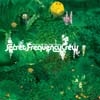 With their debut full length album, this New York City trio have created one of the most memorable melodic electronic albums in recent memory. Throughout the 11 track CD they fuse acoustic instrumentation with electronics to outstanding effect. The album works well as a whole, with many tracks segueing into one another seamlessly. Although most of the tracks are beat oriented, the varied drum sounds and patterns complement the melodic elements rather than become the focus.
With their debut full length album, this New York City trio have created one of the most memorable melodic electronic albums in recent memory. Throughout the 11 track CD they fuse acoustic instrumentation with electronics to outstanding effect. The album works well as a whole, with many tracks segueing into one another seamlessly. Although most of the tracks are beat oriented, the varied drum sounds and patterns complement the melodic elements rather than become the focus.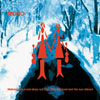 In describing the sound of Mono's third full-length album it's hard not to invoke a number of bands whom I have nevertheless sworn to eschew in the body of this review. Let it suffice to say that the music is sweeping, anthemic, instrumental, crescendo-heavy, at once deliberately delicate and mindlessly reckless; this much should give you some idea of the musical path on which Mono tread (some might even call it a new path to Helicon, to tell the truth).
In describing the sound of Mono's third full-length album it's hard not to invoke a number of bands whom I have nevertheless sworn to eschew in the body of this review. Let it suffice to say that the music is sweeping, anthemic, instrumental, crescendo-heavy, at once deliberately delicate and mindlessly reckless; this much should give you some idea of the musical path on which Mono tread (some might even call it a new path to Helicon, to tell the truth). There is something otherworldly lurking just below the surface of Klas Rydberg's strained howls that is slightly off-putting, something that is not so much heard as felt, something that draws you in while oozing a slight uneasiness. Where a majority of the increasing number of sludgy, pseudo doom acts are content to pound away on the same note for hours on end in the name of "atmosphere," this Swedish septet strives for something more on their third full length.
There is something otherworldly lurking just below the surface of Klas Rydberg's strained howls that is slightly off-putting, something that is not so much heard as felt, something that draws you in while oozing a slight uneasiness. Where a majority of the increasing number of sludgy, pseudo doom acts are content to pound away on the same note for hours on end in the name of "atmosphere," this Swedish septet strives for something more on their third full length.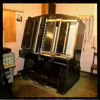 At first listen, COILANS seems like Exhibit A for the sort of experimental audio that functions as more of an intellectual or conceptual pleasure, rather than the sort of viscerally satisfying music I've come to expect from Coil. It clocks in at well over four hours of entirely unstructured, rhythm-less high-frequency sine-waves and subtly shifting AC hum. Tracks have no beginning or end, no point-counterpoint or resolution, and no tonal consistency. This new three-disc set also includes a DVD of synchronized digital animations for four of the tracks. It's a reissue and expansion of ANS, a limited edition, tour-only CD released last year, minimally packaged in an unmarked black plastic clamshell. This new boxed set comes in a beautiful foldout cardboard package (identical to the recent reissue of Nurse With Wound's Soliloquy for Lilith) decorated with pictures of the disused ANS machine itself, sitting neglected in a basement room of the Moscow State University, rarely used and in dire need of a radical overhaul. It was built in 1958 by Evgeny Murzin, who set out to create a synthesizer capable of producing the full range of audible frequency via a unique photoelectric process. The composer inscribes his visual "score" onto a glass plate covered with sticky black mastic, slides it through the machine, which reads the inscribed plate and converts the etchings into sound produced by a system of 800 oscillators. In the liner notes, which provide further technical information about the machine, Coil acknowledge that it takes a lot of practice and skill for the user to relate the marks on the plate to the resultant sounds. Soviet composer Alfred Schnittke (whose name is misspelled in the notes) spent an entire year of intensive work with the machine to produce his one and only piece of electronic music entitled "Flow." However, Coil spent only a few days with the ANS, so by their own admission, the sounds on these three discs cannot be described as "compositions" in any sense. Instead, the sounds represent an accidental interpretation of Coil's visual art into audible electricity. As such, it is pointless to assess the musical merit of any of these pieces. The soundpieces in the set are the work of various solo and group alignments of Jhonn Balance, Peter Christopherson, Ossian Brown, Thighpaulsandra and Ivan Pavlov of COH. The notes do not identify which track features which personnel, either because they can't remember or they think it doesn't matter. The CD wallets (and the prints included with the first edition of the set) feature some of the line drawings that were used to make these pieces, but once again, the listener is given no indication which drawings produced which sounds. The drawings operate as Spare-style magical talismans, where occult symbols and "alphabet of desire" glyphs representing words or phrases (such as the tautological "IT JUST IS" on the back of disc B) exist as arcane sigillizations. But the ANS is able to take these occult strategies a step beyond the usual, by transforming them into an entirely exotic lexicon of ghostly electric frequencies. This relation of visual image to sound had the effect of a strange form of synaesthesia on me as I waded through these four discs of unprocessed analog tones; I began to form novel mental connections between sound and vision, thoughts and symbols. Halfway through the third disc I had become like Nikola Tesla, obsessively listening to electronic signals trying to pick out messages he was certain were being transmitted by extraterrestrials. Is it possible for the mind to subconsciously decode this esoteric system of pulsations, throbs, clicks and whirrs? It's impossible to say with any certainty, but the mere suggestion that it might be so makes the sound entirely compelling. At first glance, the DVD animations seemed no more inventive than WinAmp visuals, but I soon noticed the subtle psychedelic abstractions present in each perfectly synchronized schema. By the end of my COILANS adventure, I was tuned into a heretofore unexplored magickal current, a current that sparks and buzzes with vibrations of the manifest spirit. Electricity has truly made angels of us all.
At first listen, COILANS seems like Exhibit A for the sort of experimental audio that functions as more of an intellectual or conceptual pleasure, rather than the sort of viscerally satisfying music I've come to expect from Coil. It clocks in at well over four hours of entirely unstructured, rhythm-less high-frequency sine-waves and subtly shifting AC hum. Tracks have no beginning or end, no point-counterpoint or resolution, and no tonal consistency. This new three-disc set also includes a DVD of synchronized digital animations for four of the tracks. It's a reissue and expansion of ANS, a limited edition, tour-only CD released last year, minimally packaged in an unmarked black plastic clamshell. This new boxed set comes in a beautiful foldout cardboard package (identical to the recent reissue of Nurse With Wound's Soliloquy for Lilith) decorated with pictures of the disused ANS machine itself, sitting neglected in a basement room of the Moscow State University, rarely used and in dire need of a radical overhaul. It was built in 1958 by Evgeny Murzin, who set out to create a synthesizer capable of producing the full range of audible frequency via a unique photoelectric process. The composer inscribes his visual "score" onto a glass plate covered with sticky black mastic, slides it through the machine, which reads the inscribed plate and converts the etchings into sound produced by a system of 800 oscillators. In the liner notes, which provide further technical information about the machine, Coil acknowledge that it takes a lot of practice and skill for the user to relate the marks on the plate to the resultant sounds. Soviet composer Alfred Schnittke (whose name is misspelled in the notes) spent an entire year of intensive work with the machine to produce his one and only piece of electronic music entitled "Flow." However, Coil spent only a few days with the ANS, so by their own admission, the sounds on these three discs cannot be described as "compositions" in any sense. Instead, the sounds represent an accidental interpretation of Coil's visual art into audible electricity. As such, it is pointless to assess the musical merit of any of these pieces. The soundpieces in the set are the work of various solo and group alignments of Jhonn Balance, Peter Christopherson, Ossian Brown, Thighpaulsandra and Ivan Pavlov of COH. The notes do not identify which track features which personnel, either because they can't remember or they think it doesn't matter. The CD wallets (and the prints included with the first edition of the set) feature some of the line drawings that were used to make these pieces, but once again, the listener is given no indication which drawings produced which sounds. The drawings operate as Spare-style magical talismans, where occult symbols and "alphabet of desire" glyphs representing words or phrases (such as the tautological "IT JUST IS" on the back of disc B) exist as arcane sigillizations. But the ANS is able to take these occult strategies a step beyond the usual, by transforming them into an entirely exotic lexicon of ghostly electric frequencies. This relation of visual image to sound had the effect of a strange form of synaesthesia on me as I waded through these four discs of unprocessed analog tones; I began to form novel mental connections between sound and vision, thoughts and symbols. Halfway through the third disc I had become like Nikola Tesla, obsessively listening to electronic signals trying to pick out messages he was certain were being transmitted by extraterrestrials. Is it possible for the mind to subconsciously decode this esoteric system of pulsations, throbs, clicks and whirrs? It's impossible to say with any certainty, but the mere suggestion that it might be so makes the sound entirely compelling. At first glance, the DVD animations seemed no more inventive than WinAmp visuals, but I soon noticed the subtle psychedelic abstractions present in each perfectly synchronized schema. By the end of my COILANS adventure, I was tuned into a heretofore unexplored magickal current, a current that sparks and buzzes with vibrations of the manifest spirit. Electricity has truly made angels of us all. Here is another album from Intr_version that perfectly conforms to my expectations. I first heard The Beans on the label's excellent Saturday Morning Empires compilation, where their "May 6th Expires" served as the closing track, a gentle, rain-saturated drift-off that managed to sound both out-of-place among label's dominant electronic artists and also very apt, as a summary of the melancholic mood-building available throughout everything I've heard from the label yet. With this, their fifth proper release, the group has made a record whose spectral, narcotic beauty I feel instantly like I've heard many times before, but will never grow tired. The Beans are from Canada, and it's hard not to align their music, however slightly, with fellow countrymen Godspeed You! Black Emperor. Bassplayer is four long "rock" instrumentals driven by the same kind of simple, sad, two-chord meditations that Godspeed layers high with the swooning textures and the odd cryptic political snippets to create their signature effect. The Beans approach the same medium with fewer musicians, a looser stylistic palette, and much less bombast. Their slow, low-rising pieces seem—like Godspeed's—to touch on very familiar, almost basic melodic components, but without as much heart-stringing, making them better open to interpretation—if not quite subversive or challenging content-wise. Nothing is particularly new about the group's style or methods; however these songs speak for themselves, as "May 6th Expires" did as the finale of Intr_version's sampler. Included here as the first track in longer form, the song saturates from the first second, an almost note-less, reverb-expanded bassline brimming and coating each lazy, jazzy slide of the guitars, hooked into each other as if guarding against a very real threat of disintegration, a feeling notably lacking from the work of Godspeed and other post-rock groups where the studied, forced character of songs often ruins their potential for dramatic intensity. Bassplayer benefits from production that retains a live feel, emphasizing the endurance and conviction of the players while making the layered crescendos of the music all the more impressive. My first thought when hearing The Beans was actually a similarity to Australia improvisers The Necks, not so much in direct tonal relationship or even in the music's structural intent, but The Necks work within a similar slow-enfolding, immersive environment in which a song's parts reveal themselves as dependent without a sense of hierarchy. And though The Beans' discography does include three film scores, they refuse the visual dependencies of most things termed "cinematic." While much of this music captures a certain melancholic urgency that could serve the right film very well, it's hard to tell if this is not simply a part of the familiarity, the comfort I find in the music. Bassplayer is special in that it takes comfortable, almost predictable associations and offers the opportunity of living inside them for a short time, a kinetic edge usually denied music of such lateral calm and tender restraint.
Here is another album from Intr_version that perfectly conforms to my expectations. I first heard The Beans on the label's excellent Saturday Morning Empires compilation, where their "May 6th Expires" served as the closing track, a gentle, rain-saturated drift-off that managed to sound both out-of-place among label's dominant electronic artists and also very apt, as a summary of the melancholic mood-building available throughout everything I've heard from the label yet. With this, their fifth proper release, the group has made a record whose spectral, narcotic beauty I feel instantly like I've heard many times before, but will never grow tired. The Beans are from Canada, and it's hard not to align their music, however slightly, with fellow countrymen Godspeed You! Black Emperor. Bassplayer is four long "rock" instrumentals driven by the same kind of simple, sad, two-chord meditations that Godspeed layers high with the swooning textures and the odd cryptic political snippets to create their signature effect. The Beans approach the same medium with fewer musicians, a looser stylistic palette, and much less bombast. Their slow, low-rising pieces seem—like Godspeed's—to touch on very familiar, almost basic melodic components, but without as much heart-stringing, making them better open to interpretation—if not quite subversive or challenging content-wise. Nothing is particularly new about the group's style or methods; however these songs speak for themselves, as "May 6th Expires" did as the finale of Intr_version's sampler. Included here as the first track in longer form, the song saturates from the first second, an almost note-less, reverb-expanded bassline brimming and coating each lazy, jazzy slide of the guitars, hooked into each other as if guarding against a very real threat of disintegration, a feeling notably lacking from the work of Godspeed and other post-rock groups where the studied, forced character of songs often ruins their potential for dramatic intensity. Bassplayer benefits from production that retains a live feel, emphasizing the endurance and conviction of the players while making the layered crescendos of the music all the more impressive. My first thought when hearing The Beans was actually a similarity to Australia improvisers The Necks, not so much in direct tonal relationship or even in the music's structural intent, but The Necks work within a similar slow-enfolding, immersive environment in which a song's parts reveal themselves as dependent without a sense of hierarchy. And though The Beans' discography does include three film scores, they refuse the visual dependencies of most things termed "cinematic." While much of this music captures a certain melancholic urgency that could serve the right film very well, it's hard to tell if this is not simply a part of the familiarity, the comfort I find in the music. Bassplayer is special in that it takes comfortable, almost predictable associations and offers the opportunity of living inside them for a short time, a kinetic edge usually denied music of such lateral calm and tender restraint.
